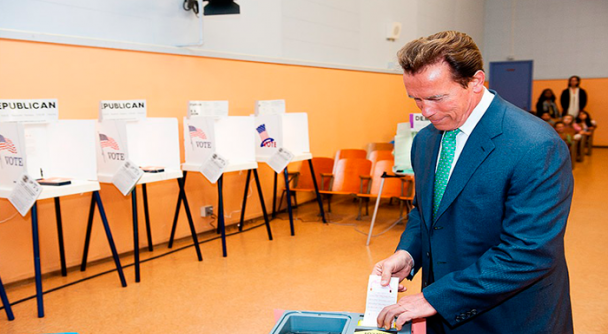Reforming our Political System

September 21, 2004 Governor Schwarzenegger signed AB 890, closing a loophole that allowed third parties to contribute to political party committees in the final days prior to an election without immediate disclosure.
November 2, 2004 California voters approved Proposition 59 by 83 percent. The “Sunshine Initiative,” championed by Governor Schwarzenegger, makes access to government records and meetings a civil right under the California constitution.
November 13, 2004 The Governor announced he would open his public schedule, making him the first sitting governor to do so. He has since made public his official state calendar, which is updated bi-weekly.
September 25, 2006 The Governor signed AB 2275 and AB 1759, which provide more transparency in the political process by requiring organizations to fully identify themselves to voters when making mass campaign solicitation calls or when contributing $5,000 or more.
October 11, 2007 The Governor signed AB 404, requiring that an advertisement paid for by an independent group supporting or opposing a candidate include a statement that it was not authorized by a candidate or candidate-controlled committee.
September 30, 2008 Governor Schwarzenegger signed SB 381, which allows Californians to register online to vote.
November 4, 2008 After five unsuccessful attempts since 1980 to take redistricting out of the hands of the legislators, California voters approved Proposition 11, to make voting districts more competitive and candidates more accountable to the people. Governor Schwarzenegger campaigned heavily for Proposition 11, which created an independent fourteen-person commission to draw district boundaries for the Senate, Assembly, and Board of Equalization. The board is composed of five Democrats, five Republicans, and four others selected through a nomination process overseen by the state auditor.
May 7, 2010 The Governor signed AB 1181, which increases public access to online information regarding campaign contributions and expenditures by candidates, officeholders, committees, major donors, and slate mailer organizations by lowering the monetary threshold that requires mandatory electronic reporting.
June 8, 2010 The Governor successfully led the effort to pass an Open Primary ballot initiative to elect more moderate candidates to office who would not be beholden to the parties and special interests. Proposition 14, approved by voters despite opposition from both parties, required candidates for statewide elections to run in a single primary that is open to all voters. The top two finishers, regardless of party, advance to a general election runoff.
September 30, 2010 Governor Schwarzenegger signed AB 1743, which helped to ensure that public retirement systems’ investment decisions are made in an impartial manner by requiring that placement agents who do business with CalPERS or CalSTRS be subject to the same reporting and ethics rules that govern lobbyists.
Continual reform Since his first year in office, the Governor supported legislation to ban or limit fund-raising during budget negotiations, including AB 3006 (2004), AB 16 (2006), AB 517 (2007), and SB 1118 (2010).
